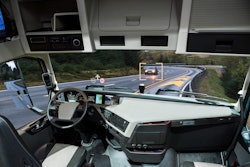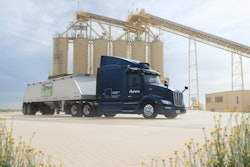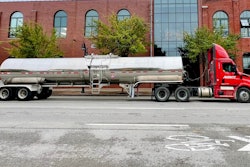Deal jokes with longtime friend and now neighbor, Warren Moody, in Deal’s nearly-finished super-shop. It’s as big as a small home.
You could say Bob Deal has gasoline in his veins. He was born in Indianapolis in 1933, during what many consider to be the golden age of auto racing. His father and grandfather were both Indy car mechanics and, when he was two years old, “Dad accidentally locked me in the shop,” Deal recounts. “He came back two hours later to find me sitting in a race car, happy as could be, playing with the pedals and steering wheel.”
Deal’s future was taking shape.
The racing years
Deal grew up watching his dad work on engines and learning the craft himself. “I learned an awful lot from Dad,” he says. “When I had a problem with a car, he’d always give me three or four things to try because, to his way of thinking, it was just as important to know what didn’t work – and why – as what did work. He never outright gave me the answer to a problem. I eventually realized that he was teaching me diagnostics.”
Engines and racing became a lifestyle for Deal. His dad would pick him up at school so they could travel to a Friday night race, wherever it was that week.
Not surprisingly, Deal became a race-car mechanic, signing on with teams like Baker Engineering, Pat Clancy, Duane Carter, Firestone, Cheesman Racing, and Bill Stroppe and the Ford stock car racing team. “Working around race cars, I had the opportunity to meet and work with all the Indy 500 drivers of that era,” says Deal. “It was dream come true.”
While Deal was turning wrenches for Cheesman Racing, the team car, driven by Eddie Sachs, took the 1958 Sprint Car Championship. “It was like winning twice in one day,” Deal recalls. “Because we got the championship, and I met the girl who would become my wife.” He and Jan are still together, and they have two daughters, Lindsay and Wende, and one son, Rob.
Horizons expanded
While Deal immensely enjoyed his work as a racing mechanic, he eventually had to come to grips with the fact that it was seasonal employment. So, after a few years spent installing bowling machines for AMF – and working on cars nights and weekends – he became a sales rep for Ford industrial engines and received Ford’s Outstanding Salesman award in 1964.
In 1965, Deal moved to Detroit Diesel as an application service engineer. “It worked out very well,” he says, “due in great part to two special engineers there who became my mentors.
Warren Moody and Bob ‘Rosie’ Rosenthal always took the time to help me, a 4-cycle gas engine guy, to understand 2-cycle diesels and the intricacies of corporate bureaucracy.”
“Bob and I hit it off right away, because we were both mavericks,” remembers Moody, now retired. “Neither of us accepted that things had to be done a certain way, just because that’s the way they’d always been done.
“But Bob was from a racing background, where you would keep it wound up and get there first, because that’s where the money is. What he needed to learn is that, in trucking, it’s not getting there fast, but getting there on time, economically, that’s important. He’s a quick study, though. He picked it up fast.”
“It was a hell of an education,” says Deal, “and the three of us remain the best of friends today.”
Moody’s and Rosenthal’s mentoring left a deep, lasting impression on Deal, who would himself become a valued mentor to many in the industry as his career progressed.
Sending a strong Signal
In 1969, a friend at Leaseway Transportation asked Deal if he’d be interested in a job as director of maintenance for a new contract carrier they were starting, Signal Delivery Service, in Atlanta.
He took the job but, after moving his family to Atlanta and seeing the facility, he seriously questioned the wisdom of his decision. “The shop floor was so dirty, you couldn’t tell if it was concrete or dirt,” he remembers. “When it rained, we’d get up to 4 inches inside. The parking lot was way too small, and there was almost no room for parts storage.
“I was very disgusted, and didn’t know what to do first,” Deal continues. “In her infinite wisdom, my wife said, ‘Just do something. It has to be an improvement.’ So I decided that the place should be as clean as a race-car shop. After much complaining from the shop personnel,
A rare, quiet moment at home. Bob and Jan with their camera-shy dog, Lucky.
we managed to get the place cleaned up, and established some order and an understanding as to who was in charge. The rules were simple: Do your best work, but, if you drop it, pick it up. If you spill it, wipe it up. Put the trash in the trash can, and empty it when it’s full. Or go work somewhere else.”
Much to Deal’s delight, the mechanics stopped complaining and developed a newfound sense of pride. Their tool boxes were cleaned, repainted or replaced. They brought their families in to see the shop. Productivity flourished. And, “unless they died or were caught stealing, no one ever left,” says Deal. “Sometimes, it really is that simple.”
Two years into Deal’s tenure at Signal, his boss acknowledged that the company’s linehaul operation was well under control, but that its city operation was not faring as well.
Deal knew at least part of the problem was that Signal’s large tractors were overkill for urban work. So he worked with GMC, Detroit Diesel and Eaton to have 20 small, tilt-cab tractors built.
Although GMC and Ford refused to build the additional 500 new tractors Deal wanted, the original 20 cost $3,500 less per unit than Signal’s larger tractors. Moreover, they got a solid 6.2 mpg, as opposed to the larger units’ 2.6 mpg. The first year the new trucks were in service, the company saved about $70,000.
Deal continued to bring many new, even revolutionary, ideas to Signal. One was the purchase of a portable, Go-Power dynamometer for “a few thousand dollars.” It could be quickly attached to the output shaft of a vehicle’s transmission, either in-frame or out. “It was ideal for verifying or, more often, disproving low-power complaints from drivers,” he says. “It was also great for setting up new and rebuilt engines for peak performance and fuel efficiency. We would tow it around from shop to shop on a small trailer. Once the dyno started showing up at our various maintenance locations, it was amazing how quickly the low-power complaints stopped.”
Deal was also one of the first to get a handle on real fuel consumption numbers. During the early-’70s fuel crisis, he, Rosenthal and a few other engineers concluded that, without a temperature-conversion factor to compensate for expansion and contraction of fuel volume, weighing the fuel before and after each fuel-economy run was a good way to get an accurate picture of how much fuel was actually used. Their work led to the development of fuel-economy testing procedures by the Society of Automotive Engineers and the Technology & Maintenance Council, which are now the industry standard.
Determined to improve fuel efficiency, Deal, Rosenthal and others began experimenting with radical – for the time – powertrain configurations. They found that, with Rosenthal’s tweaked, high-droop governor springs and a specially built Eaton 3.33:1 rear axle, they could get a Detroit 6-71 to run at highway speeds at a mere 1600 rpm. This contributed to the development of low-rpm diesels, and was the basis for the “gear-fast, run-slow” concept, now widely accepted as a way to improve fuel efficiency.
But, for all his progressive ideas, Deal has never forgotten the value of good, solid vehicle maintenance. “Good maintenance more than pays for itself,” insists Deal. “It reduces downtime, which is a wasteful expense, and ensures that vehicles will be ready to perform.
That increases customer satisfaction. Also, clean, well maintained equipment always brings a better price at resale time.”
Deal has always encouraged his technicians to use the “3-foot circle” approach when inspecting equipment. “If a guy is working on a fifth wheel, he should also be looking at everything within 3 feet of it,” he says. “That means spring hangers, U-bolts, air lines and electrical connections… There’s no excuse for letting potential problems slip by.”
Sharing the knowledge
Recognizing the value of sharing experiences with his peers, Deal joined TMC’s predecessor, the Regular Common Carriers Conference in 1971, and was elected vice chairman in 1979. He served on the Board of Directors of newly-formed TMC for several years, headed multiple study groups and task forces, and was awarded the Silver Spark Plug – TMC’s highest honor – in 1982. He was elected TMC General Chairman in 1983.
Deal was instrumental in starting several industry initiatives, including the European Transportation Maintenance Council and TMC’s Tomorrow’s Truck Program. But he’s become best known over the years for taking newer TMC members under his wing, helping them with their problems and encouraging them to get involved.
“When I attended my first TMC meeting in 1979, Bob came up to me and asked who I was, what I did and asked if he could help me in any way,” recalls Bob Flesher, managing director,
Deal had plaques like this one affixed to dashboards to assure drivers that there was nothing wrong with their engines. It was the beginning of gear-fast/run-slow.
vehicle maintenance, FedEx Ground, Wexford, Pa., and fellow Career Leadership Award recipient. “At the time, I only knew of Bob from magazine articles that had been written about him. Needless to say, I was quite impressed that a ‘media star’ would even talk to a rookie like me.”
“I’ve seen Bob mesmerize a room full of maintenance professionals with his knowledge and professional competence,” adds Bill Tracy, former executive director of TMC. “Like all good leaders, he challenges all assumptions and forces people to think.”
An end, a new beginning
In the late ’80s, shortly after the last original owner of Leaseway died, Signal Delivery closed its doors. Since then, Deal has leased trailers, become a successful consultant and advisor to several well-known industry businesses – including CCJ – and has recently taken over the maintenance operation of a large, southern-based fleet.
When he’s not working, which he admits is not often, he enjoys going to races, spending time with his family and working on their beautiful, sprawling South Carolina property – which includes a garage and machine shop that would elicit a hearty “Ruhh, Ruhh!” from Tim ‘The Tool Man’ Taylor. “The Good Lord has smiled on me,” says Deal. “I’ve been lucky.”
“Bob has had a long career, filled with successes, not only in his employment, but as a big part of the TMC team that has shaped improvements to trucks,” sums up FedEx’s Flesher. “He still comes to meetings, still voices strong opinions and, more importantly, still offers to help anyone who needs it. Bob is one of the few of a special breed of no-nonsense maintenance leaders.”
About the Career Leadership Award
CCJ’s Career Leadership Award is now in its 27th year. Formerly known as the Fleet Maintenance Executive Career Leadership Award, its new name, the Technology and Maintenance Career Leadership Award, better represents the evolving role of today’s maintenance executive and the increasing importance of information technology.
The award is not a contest to be won, but a distinction earned throughout a career of dedication to professionalism and excellence in technology and maintenance management.
Anyone can nominate a candidate who has made a career of fleet maintenance management simply by writing a letter, making a call, sending an e-mail to any CCJ editor or filling out an online form at www.ccjmagazine.com, indicating why the individual being nominated should be considered.
The final few candidates are checked out as thoroughly as possible to verify their accomplishments, involvement, leadership and contributions to the profession.
Personal and professional integrity, and the candidate’s reputation among his or her peers, also weigh heavily in the final decision.










